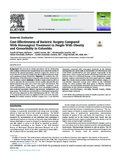Mostrar el registro sencillo del registro
Cost-effectiveness of bariatric surgery compared with nonsurgical treatment in people with obesity and comorbidity in Colombia
| dc.rights.licence | Atribución-NoComercial 4.0 Internacional | * |
| dc.contributor.author | Gil-Rojas, Yaneth | |
| dc.contributor.author | Garzón, Andrés | |
| dc.contributor.author | Lasalvia Rodriguez, Pieralessandro | |
| dc.contributor.author | Hernández, Fabián | |
| dc.contributor.author | Castañeda-Cardona, Camilo | |
| dc.contributor.author | Rosselli, Diego | |
| dc.coverage.spatial | Colombia | spa |
| dc.date.accessioned | 2020-03-27T20:25:50Z | |
| dc.date.accessioned | 2020-04-15T13:26:54Z | |
| dc.date.available | 2020-03-27T20:25:50Z | |
| dc.date.available | 2020-04-15T13:26:54Z | |
| dc.date.created | 2019-05-19 | |
| dc.identifier | https://www-sciencedirect-com.ezproxy.javeriana.edu.co/science/article/pii/S2212109919300500#! | spa |
| dc.identifier.issn | 2212-1099 / 2212- 1102 (Electrónico) | spa |
| dc.identifier.uri | http://hdl.handle.net/10554/47900 | |
| dc.format | spa | |
| dc.format.mimetype | application/pdf | spa |
| dc.language | spa | spa |
| dc.rights.uri | http://creativecommons.org/licenses/by-nc/4.0/ | * |
| dc.source | Value in Health Regional Issues; Vol. 20 (2019) | spa |
| dc.title | Cost-effectiveness of bariatric surgery compared with nonsurgical treatment in people with obesity and comorbidity in Colombia | spa |
| dc.type | info:eu-repo/semantics/article | |
| dc.type.hasversion | http://purl.org/coar/version/c_ab4af688f83e57aa | |
| dc.description.quartilescopus | Q2 | spa |
| dc.identifier.doi | https://doi.org/10.1016/j.vhri.2019.01.010 | spa |
| dc.description.tipoarticulo | Artículo original | spa |
| dc.description.paginas | 79-85 | spa |
| dc.format.soporte | Papel / Electrónico | spa |
| dc.subject.keyword | Cost-effectiveness | spa |
| dc.subject.keyword | Cost-utility | spa |
| dc.subject.keyword | Bariatric surgery | spa |
| dc.subject.keyword | Obesity | spa |
| dc.subject.keyword | Pharmacologic treatment | spa |
| dc.description.abstractenglish | Background The increase in obesity prevalence and its relationship with multiple cardiovascular complications have raised the burden of obesity in the general population. Bariatric surgery has shown to be more effective in reducing weight than the traditional pharmacologic and nonpharmacologic treatments. Objective To evaluate the cost-effectiveness of this alternative compared with standard treatment in the Colombian context. Methods A Markov single cohort model was used to simulate the incremental cost per quality-adjusted life-year (QALY) gained every year over a base-case 5-year time horizon. The model considers 5 health states: comorbidity, remission, acute myocardial infarction, stroke, and death. Four comorbidity conditions were evaluated separately: diabetes, hypertension, dyslipidemia, and sleep apnea. The model was evaluated from a third-payer perspective. All costs were expressed in 2016 Colombian pesos ($1.00 = 3051 COP). A 5% annual discount rate was applied to both costs and outcomes. Results In baseline analysis, bariatric surgery was a cost-effective alternative compared with nonsurgical treatment in the diabetes and hypertension cohort with an incremental cost-effectiveness ratio of $6 194 899 and $43 689 527 per QALY gained, respectively. In the sleep apnea cohort, surgery has greater effectiveness and lower costs, which is why it is a dominant strategy. In the dyslipidemia cohort, bariatric surgery is dominated by the nonsurgical approach. Conclusion The current study provides evidence that bariatric surgery is a cost-effective alternative among some cohorts in the Colombian setting. For obese patients with sleep apnea or diabetes, bariatric surgery is a recommendable alternative (dominant and cost-effective, respectively) for the Colombian healthcare system. | spa |
| dc.type.local | Artículo de revista | spa |
| dc.contributor.corporatename | Pontificia Universidad Javeriana. Facultad de Medicina. Departamento de Epidemiología Clínica y Bioestadística |
Ficheros en el registro
Este registro aparece en la(s) siguiente(s) colección(ones)
-
Artículos [682]


